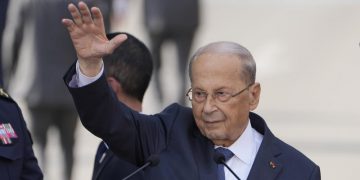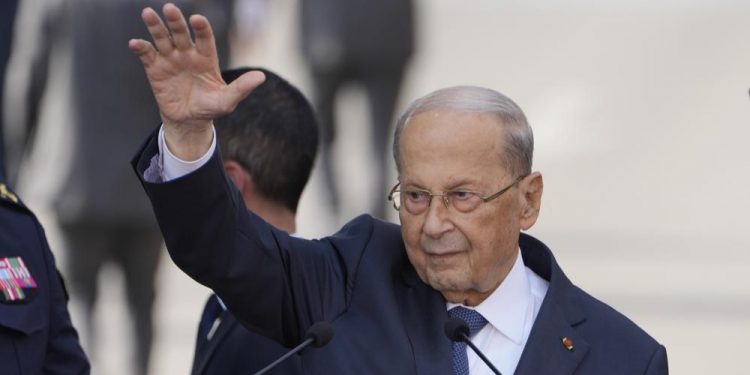By Enyichukwu Enemanna
Lebanon’s President, Michel Aoun on Sunday left the presidential palace, marking the end of his six-year term without a successor. This leaves the small nation in a political vacuum that is likely to worsen its historic economic meltdown.
As Aoun’s term ends, the country is being run by a caretaker government after Prime Minister-designate Najib Mikati failed to form a new Cabinet following May 15 parliamentary elections.
Aoun and his supporters warn that such a government doesn’t have full power to run the country, saying that weeks of “constitutional chaos” lay ahead.
In a speech outside the palace, Aoun told thousands of supporters that he has accepted the resignation of Mikati’s government. The move is likely to further deprive the caretaker administration of legitimacy and worsen existing political tensions in the country.
Mikati responded shortly afterward with a statement from his office saying that his government will continue to perform its duties in accordance with the constitution.
Many fear that an extended power vacuum could further delay attempts to finalize a deal with the International Monetary Fund that would provide Lebanon with some $3 billion in assistance, widely seen as a key step to help the country climb out of a three-year financial crisis that has left three quarters of the population in poverty.
While it’s not the first time that Lebanon’s parliament has failed to appoint a successor by the end of the president’s term, this will be the first time that there will be both no president and a caretaker cabinet with limited powers.
Lebanon’s constitution allows the cabinet in regular circumstances to run the government, but is unclear whether that applies to a caretaker government.
Aoun, Lebanon’s 13th president since the country’s independence from France in 1943, saw Beirut’s historic relations with oil-rich gulf nations deteriorate because of Hezbollah’s powers and one of the world’s largest non-nuclear explosions at Beirut’s port in August 2020 that killed more than 200.
Aoun blasted his political opponents and said that they prevented him from bringing to justice central bank governor Riad Salameh, who is being investigated in several European countries, including Switzerland, France, Luxembourg and Liechtenstein for alleged money laundering and embezzlement.
“I leave a country that is robbed,” Aoun said, adding that all Lebanese were hurt by losing their life savings in local banks. He added that some politicians prevented the investigation into the port blast.
Aoun, who blamed his political rivals and others for the crisis except for members of his political party, later left the palace and headed to his residence in Beirut’s northern suburb of Rabieh.
Aoun’s biggest achievement came last week. He signed a US-mediated maritime border agreement with Israel that Beirut hopes will lead to gas exploration in the Mediterranean. That will presumably help Lebanon come out of its economic crisis that has been described by the World Bank as one of the worst the world has witnessed since the 1850s.




































